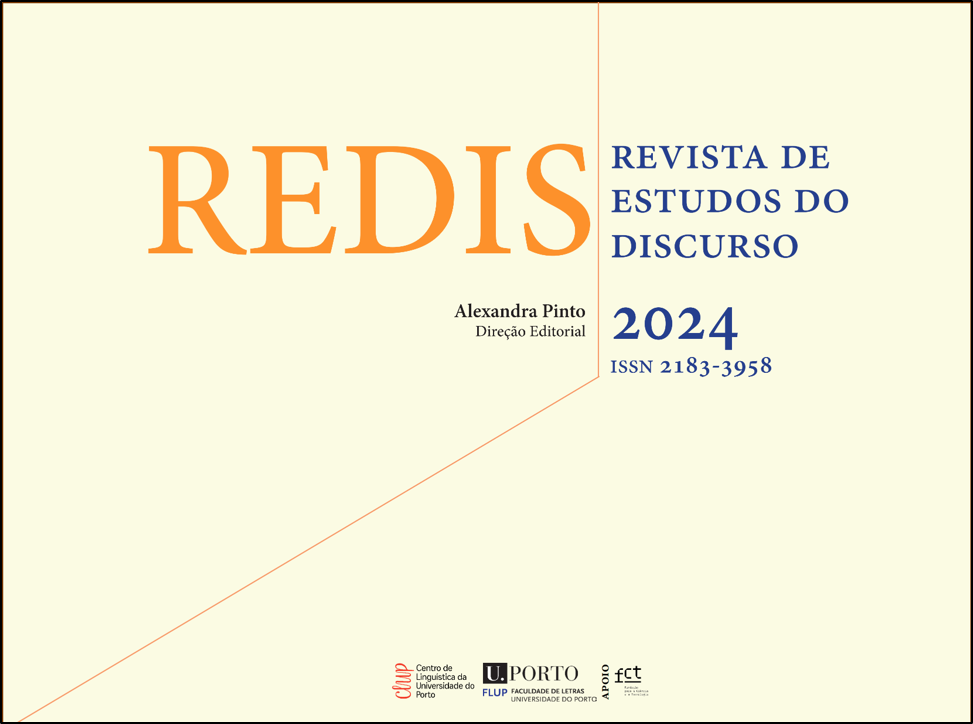Biographical Narrative and the Discursive Construction of History: A Case Study of the Coluna Prestes Through the Lens of Biographer Anita Leocádia Prestes
DOI:
https://doi.org/10.21747/21833958/red15a1Keywords:
Historiographical biography, Memory, Modes of Discourse Organization, Coluna PrestesAbstract
The life trajectory of emblematic political figures in Brazilian history can be (re)constructed and (re)signified through a discursive reconstruction of the past. Historiographical biography provides a unique space for expressing new perspectives on reported events, functioning as a locus of counter-argumentation against previously established discourses about the biographed figure. In this sense, this genre fosters reflections on the relationships between history, memory, and identity, contributing to the production of (new) meanings through a memorialistic narrative. From this perspective, this study analyzes the projected images of Luiz Carlos Prestes associated with the political-military movement of the Coluna Prestes as presented in Luiz Carlos Prestes, um comunista brasileiro, written by his daughter, Anita Leocádia Prestes. To achieve this, we employ the Modes of Discourse Organization proposed by Charaudeau’s Semiolinguistic Theory (2008), with a focus on the Descriptive and Narrative Modes. The study highlights how historiographical biographical writing articulates memory and identity, generating effects from its discursive materiality that resonate with the memories of Luiz Carlos Prestes from the author's perspective and, concurrently, with the collective memory of the Brazilian nation.
References
Abreu-Aoki, R. (2016). Getúlio Vargas encadernado: A construção narrativo-argumentativa da imagem do estadista em Getúlio Vargas, meu pai. [Tese de Doutoramento. Faculdade de Letras da Universidade Federal de Minas Gerais].
Benveniste, É. (1983). Problèmes de linguistique générale, 2. Éditions Gallimard.
Bourdieu, P. (1998). A ilusão biográfica. In: Amado, J., & Ferreira, M. de M. (Orgs.), Usos e abusos da história oral (pp. 183–191). Editora da FGV.
Candau, J. (2016). Memória e identidade. Contexto.
Charaudeau, P. (2008). Linguagem e discurso: Os modos de organização (Coordenação da equipe de tradução Ângela M. S. Corrêa & Ida Lúcia Machado). Contexto.
Foucault, M. (1996). A ordem do discurso (L. F. A. Sampaio, Trad., 3a ed.). Edições Loyola.
Gaudencio, B. R. de A. (2022). Nas terras do sul nasce o herói: Origens e ascendências nas narrativas biográficas de Luiz Carlos Prestes. Revista NUPEM, 14, 59–78. Recuperado em 24 nov. 2024, de https://periodicos.unespar.edu.br/index.php/nupem/article/view/4779/4722.
Le Goff, J. (2013). História e memória (Bernardo Leitão et al. Trad., 7a ed., rev.). Editora Unicamp.
Lejeune, P. (2008). O pacto autobiográfico. Editora UFMG.
Martins-Fontes, Y. (2022). Anita Leocádia Prestes: Professora, historiadora, militante (entrevista / 2021-2022). Expedições Morrinhos, 14, 104–119.
Peneff, J. (1990). Myths in life stories. In: Samuel, R., & Thompson, P. (Orgs.), The myths we live by (pp. 84–95). Routledge.
Prestes, A. L. (2015). Luiz Carlos Prestes: Um comunista brasileiro. Boitempo.
Robin, R. (2016). A memória saturada (C. Dias & G. Costa Trad.). Editora da Unicamp.
Downloads
Published
How to Cite
Issue
Section
License
Copyright (c) 2024 Raquel Lima de Abreu-Aoki, Marcia Elisia Matos Aguiar

This work is licensed under a Creative Commons Attribution 4.0 International License.
The authors give to REDIS. Revista de Estudos do Discurso the exclusive right to publish its texts, in any medium, including their reproduction and sale in paper or digital format, as well as their availability in a free access regime in databases.
















